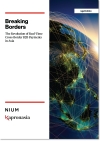Latest Insight
- Why an expected APAC fintech consolidation wave has yet to come
- Why cash is still prevalent in Asia
- Japan steps up green finance efforts
- South Korea charts middle path on crypto
- Should Grab and GoTo merge?
- Singapore pushes ahead with fintech-driven sustainability
- Digital banks in South Korea continue to thrive
- Billease is the rare profitable BNPL firm
- Fintech sector in Pakistan faces mounting challenges
- Where digital banks in Asia can make a difference
Latest Reports
-
Breaking Borders
 Despite progress in payment systems, the absence of a unified, cross-border Real-Time Payments (RTP) network means that intermediaries play a crucial role in facilitating connectivity. This report examines the ongoing complexities, challenges, and initiatives in creating a seamless payment landscape across Asia. Innovate to Elevate
Despite progress in payment systems, the absence of a unified, cross-border Real-Time Payments (RTP) network means that intermediaries play a crucial role in facilitating connectivity. This report examines the ongoing complexities, challenges, and initiatives in creating a seamless payment landscape across Asia. Innovate to Elevate In the dynamic and diverse financial landscape of the Asia-Pacific (APAC) region, banks are at a pivotal juncture, facing the twin imperatives of innovation and resilience to meet evolving consumer expectations and navigate digital disruption. Catalyzing Wealth Management In The Modern Era
In the dynamic and diverse financial landscape of the Asia-Pacific (APAC) region, banks are at a pivotal juncture, facing the twin imperatives of innovation and resilience to meet evolving consumer expectations and navigate digital disruption. Catalyzing Wealth Management In The Modern Era Hyper-personalized wealth management presents a paradigm shift from traditional models relying on static, generalized segments. Developing tailored investor personas based on psychographics, behaviours and fluid financial goals enables financial institutions to deliver rich and tailored customer experiences that resonate with next-generation priorities.
Hyper-personalized wealth management presents a paradigm shift from traditional models relying on static, generalized segments. Developing tailored investor personas based on psychographics, behaviours and fluid financial goals enables financial institutions to deliver rich and tailored customer experiences that resonate with next-generation priorities.
Events
| October 21, 2024 - October 24, 2024 Sibos Beijing |
| November 06, 2024 - November 08, 2024 Singapore Fintech Festival |
At the end of 2017, regulations tightened around the cash loan industry in China and locked 36% as the highest APR lenders can collect on any loans. One year later, although many platforms have disappeared, others have transformed and are back at the forefront of lending in China.
In China, financial cloud has become a key goal for financial institutions in 2016. According to ‘the 13th Five-year Plan’, by the end of 2020, banks’ online business system should all be transferred to cloud and more than 60% of their other business systems should be moved online. With this clear direction, banks are taking actions. The China Academy of Information and Communications Technology (CAICT) found that in 2017, 42% of financial institutions are applying to use cloud, whilst 47% are in the process of planning the transition to cloud as companies seek to establish agile banking infrastructure.
On September 18th 2018 the MAS launched the Singapore Quick Response Code (SGQR). Within the next year, 27 different mobile wallet providers including PayNow, NETS, GrabPay, Liquid Pay, and Singtel Dash will incorporate the new standardised code. The SGQR is the first of its kind globally and represents a significant change to the e-payment landscape. Interoperability is seen as a key infrastructural requirement for mobile payments and will have several impacts on new and incumbent firms in the market.
At the end of last month, another Chinese fintech company Samoyed Holding filed for $80 million IPO on the New York Stock Exchange. The company provides consumer finance services for the Chinese millennials. Its main business is the credit card balance transfer business, counting for 74.7% of its 2017 turnover.
Financial results from China's banks are improving recently as tight regulation is limiting the expansion of 3rd party competition, while overall bank profitability is increasing.
During the Internet Security Summit in Beijing on August 21st, Ant Financial announced the official upgrade for the security control of its digital payment platform – Alipay. The more secured process is achieved through what is called a 'Delayed Payment' (DP) function.
One morning in July, investors of Niubanjin Finance, a P2P platform with balance of 39 billion RMB at that time, tried to check their balance online, but only saw a system maintenance notification. They started feeling anxious and visited the local office in Hangzhou, only to find that the office had closed, and two policemen there to record their investment information, as proof of victims.
More and more Chinese individuals have accumulated a great amount of wealth thanks to the country’s economy boom in the past decades. As a result, the demand of wealth management is growing. With the help of new technologies, mobile wealth management (MWM) platforms are attracting more and more investors in China recently.
Fortune released the latest Global Top 500 list recently. 120 Chinese companies made the list, while US took the lead with 126 companies. Banking was the leading industry in China as China's banks come to the forefront again.
President Trump’s latest controversial policy of imposing tariffs on the EU, Canada and China has shook global trade. With around $34bn worth of tariffs on Chinese goods (with more tariffs proposed), he aims to reduce the US’s trade deficit with the hope that American consumers will buy less Chinese goods and more American goods, thus increasing net exports and GDP. However, China has retaliated with its own tariffs against the US (worth the same amount). It is clear that neither side wants to back down first so who will win this trade war?
More...
The 20th China-EU high summit was held in Beijing this past week and attracted a lot of attention due to the current global trade tensions. As the speculation on trade war continues, the EU and China decided to stand together against Trump’s attack on the global trade system.
We have talked about the trend before, but starting to see more and more cooperation between fintech companies and banks. China Construction Bank Wenzhou Branch is now in cooperation with Alipay for a hospital payment service channel, ICBC is supporting WeChat’s QR code payment and JD finance and Citic Bank have issued over 2 million co-branded credit cards called the ‘White Card’. We're also starting to better understand the potential business models for both sides.
June 25th 2018, Ant Financial launched its E-wallet cross-border remittance service based on blockchain technology. Customers using Alipay HK can transfer money in real time to another E-wallet Gcash based in the Philippines.
China's tech giants are increasingly focused on positioning themselves as technology providers rather than financial services providers. A recent 3-second blockchain remittance from Hong Kong to the Philippines, was supported by Alipay HK and Philippine's GCash, cleared by Standard Chartered. Caifu Hao, a wealth management platform launched by Ant Financial, opened their AI-functioned investment tools to fund companies. Tencent recently signed contracts with a few banks to provide a financial cloud structure for acquiring and managing growing clients.
The Hong Kong Monetary Authority (HKMA) published revised ‘Guideline on Authorization of Virtual Banks’ on May 30th, 2018, opening the gateway of a new banking type – virtual bank.
